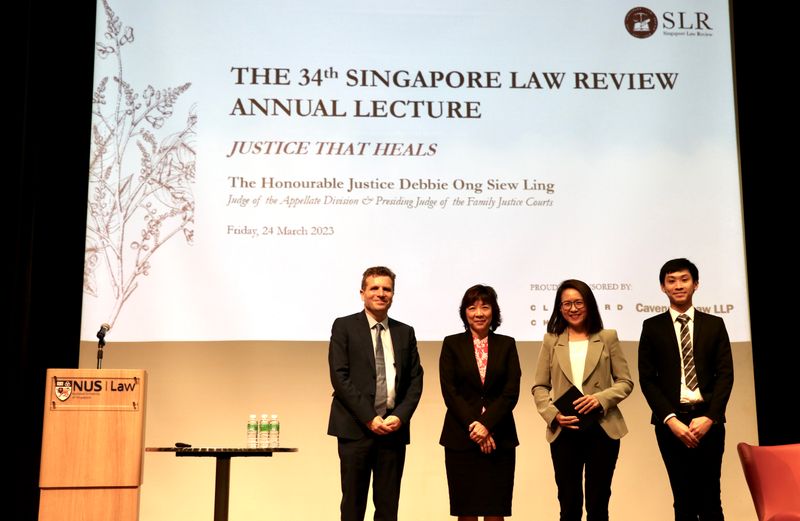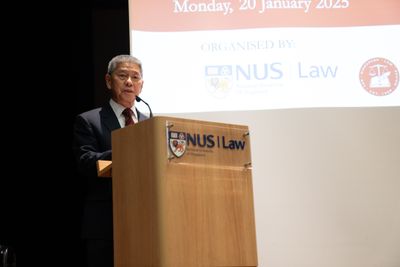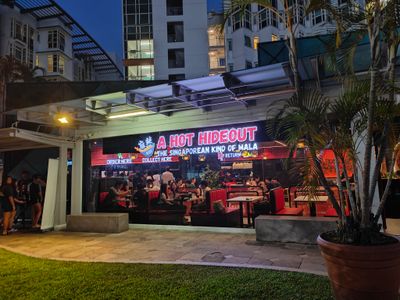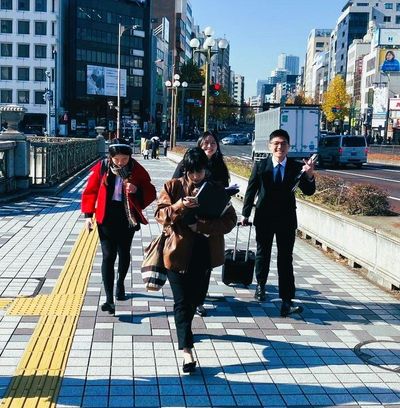The 34th edition of the Singapore Law Review (SLR) Annual Lecture was held in the auditorium of Bukit Timah Campus on Friday, 24 March 2023, from 7-9 pm.
Despite it being the start of the weekend, the lecture was well-attended, with a good mix of members of the legal fraternity, social workers, students and several prolific members of the judiciary.
Since 1984, the Annual Lecture has been the flagship event of the SLR, which is Asia’s oldest student-run legal publication. After two years of holding the Annual Lecture online due to COVID, 2023 marked the Annual Lecture’s long-awaited return to the in-person format.
The event opened with remarks from Mr Darrick Poh, the Chief Editor of SLR, followed by a welcome address by Professor Damian Chalmers, Vice Dean (Research) and Geoffrey Bartholmew Professor at NUS Faculty of Law. Then, Ms Lena Ng, Partner at Clifford Chance (which was the event’s sponsor), introduced Justice Debbie Ong Siew Ling—the guest speaker for this year’s edition of the Lecture.
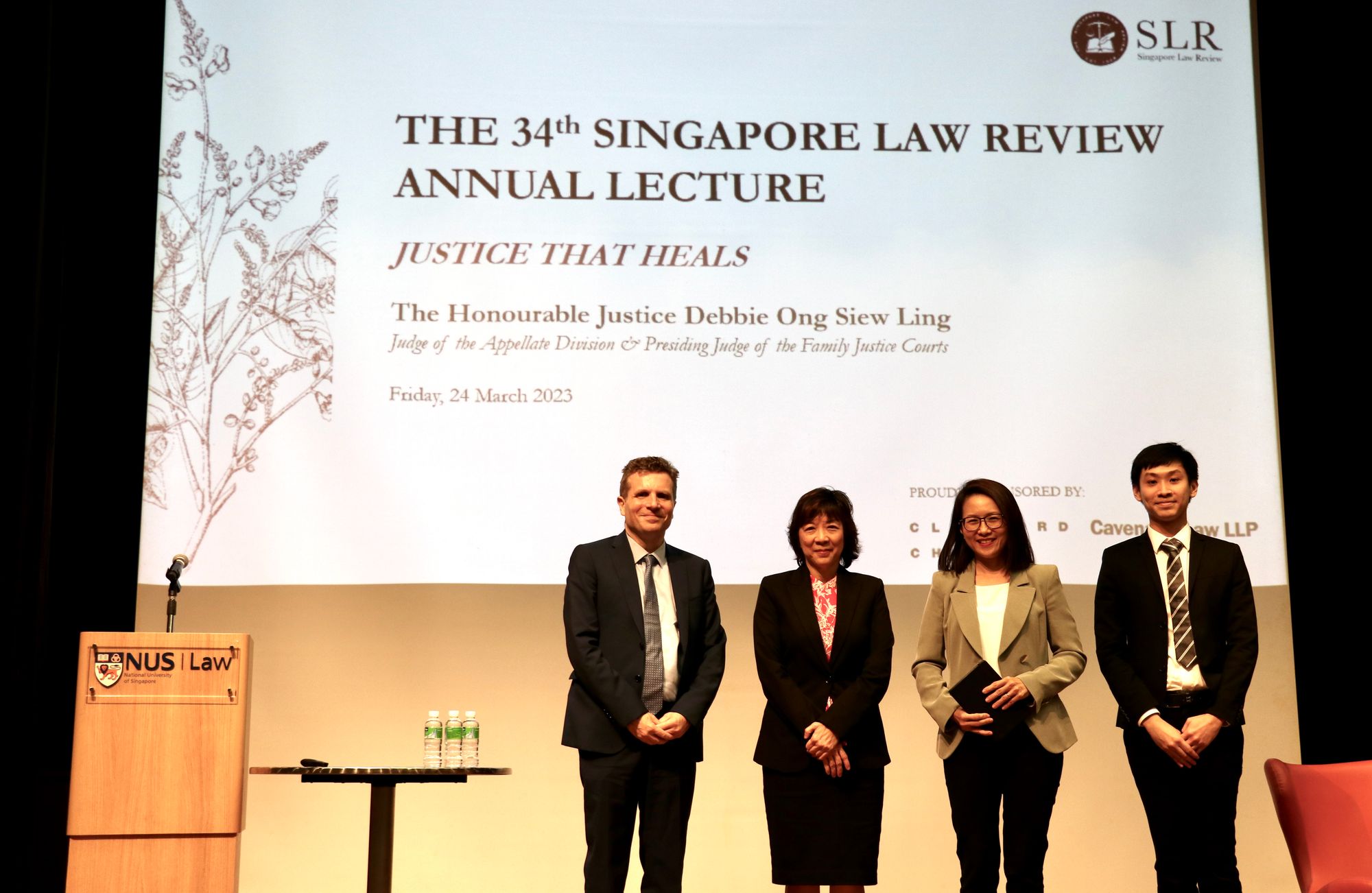
Hearty chuckles could be heard throughout the auditorium as Justice Ong delivered her opening lines with her signature wit: “Good evening to all of you here, who are spending Friday night at a lecture. It is good to know that this is the life that we all have.”
Justice Ong then quipped that the law school auditorium was where she once used to invigilate exams, “... walking up and down the aisles, hoping to give out more booklets, because in those days, you had to handwrite your answers.”
Justice Ong’s legal career began as an academic at the NUS’s Faculty of Law in 1989, where she specialised in family law. It was therefore unsurprising that for this lecture, Justice Ong chose to talk about family law and the meaning of justice in the family law context.
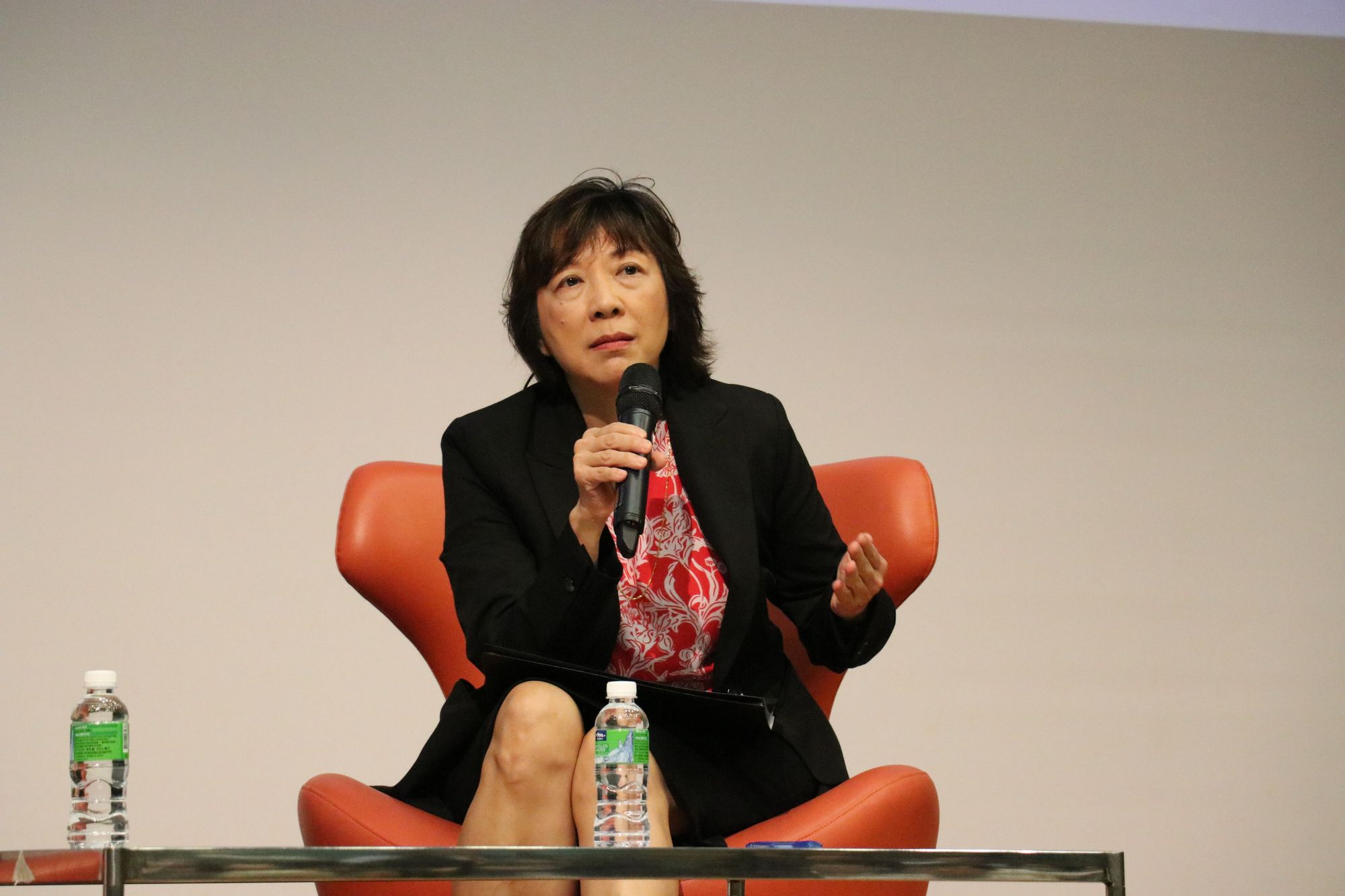
Justice is normally associated with rights, embodied in the distributive and corrective approaches to justice. Similarly, we usually think of going to the courts as a combative and adversarial experience. However, in Justice Ong’s view, we should demand more of our understanding of justice and of the court’s role in meting out that justice. She thinks that justice should be about healing; the court, a place that we go to for resolution.
“If I had to pick an area where we can showcase what resolution can be, I would pick family law,” said Justice Ong.
Through references to cases, extracts of acrimonious letters sent to opposing counsel, and a heartbreaking letter written from the perspective of a child about shared time, parenting and separation, Justice Ong proceeded to explain the three post-divorce ancillary matters that ‘reorganising a family’s living arrangements’ entails. Then, she laid out her vision for what a legal system that is suited to achieving those aims looks like. To Justice Ong, the answer can only be a legal system built on the principles of therapeutic justice (TJ).
Unlike a rights-based conception of justice, therapeutic justice promotes a non-adversarial system. It is problem-solving, and should be viewed as a lens of care through which we can look at matters and ask whether something would best help parties to move forward, instead of leaving them mired in the past.
The Singapore Court of Appeal has endorsed and applied the concept of therapeutic justice in VDZ v VEA [2020] at [77]:
“TJ is not merely an ideal; it is a necessity. It is not merely theoretical but is intensely practical. It is axiomatic that relationships constitute the very pith and marrow of a family. When familial relationships break down, those relationships (between spouses and between each spouse and the children) are damaged. Such damage cannot be repaired (completely at least) by way of material recompense; healing needs to take place. It is both logical and commonsensical that healing cannot even begin to take place if the parties (in particular, the former spouses) are in an antagonistic relationship - still less when one or both parties wage war against each other. As Justice Ong noted, a kind act begets a kind response while a nasty act inflames the other. …”
Justice Ong identified four hallmarks of a TJ-based family justice system: (1) A non-adversarial system; (2) a problem-solving approach to resolution with upstream access to lawyers, counsellors, mediators and therapeutic and community services and, downstream, a judge-led problem-solving approach; (3) a reliance on subject-matter experts and multidisciplinary TJ teams and (4) being forward-looking and helping parents to appreciate the impact of their actions and their parental responsibility in supporting their childrens’ welfare, instead of penalising bad conduct. To achieve this, Justice Ong called for synergy between the court system, judges and lawyers.
Justice Ong also challenged the audience to think about how the TJ framework could potentially apply to other areas of law beyond family law. For example, civil disputes with an element of relationships gone wrong (e.g. best friends, siblings, business partners where parties have to continue working together even after the litigation ends), and in criminal proceedings, where a judge-led approach could be beneficial in treating witnesses with greater sensitivity.
Finally, Justice Ong touched on some of the challenges in family lawyering in the 21st century: the emotionally charged nature of family work, the demands presented by new court systems (like TJ), the need for mastery in an area of law rich in the doctrines of philosophy, and the globalisation of family law.
Despite these difficulties, Justice Ong remains steadfast in her belief that family law is meaningful, and stressed the need for good mentorship in family law.
“Why do people become lawyers? Justice is really why you come into the legal profession, and I think that family lawyers continue to answer that call to justice. Those of you who are into family law, senior academics, judges: let us inspire the young ones, the next generation, open their eyes to the joys and rewards, the meaningfulness that comes from practising justice. Especially justice that heals.”
During the Question-and-Answer segment, several members of the audience—practitioners, professors and students alike—stepped up to the microphones along the aisles to pose their thoughts to Justice Ong.
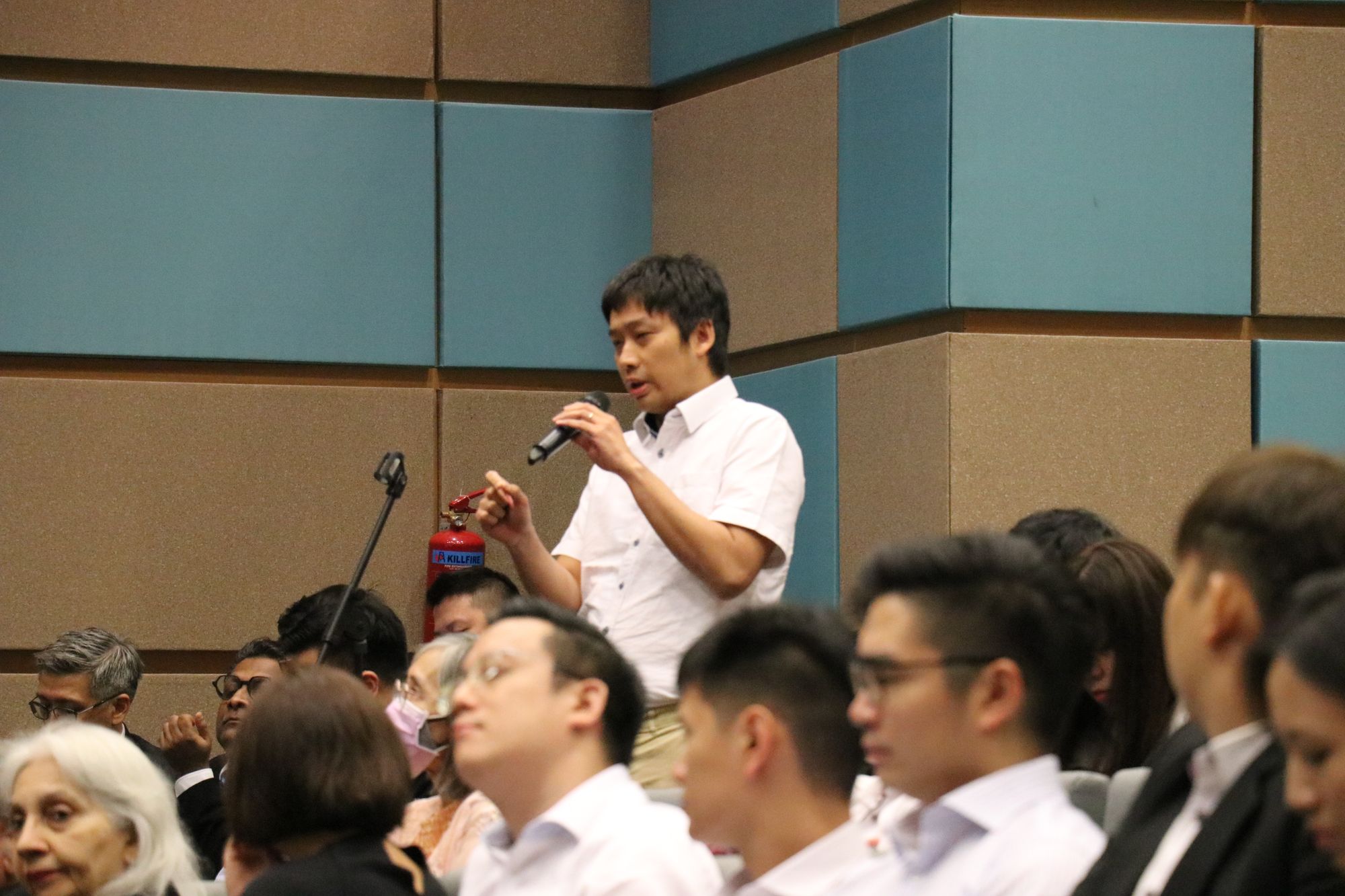
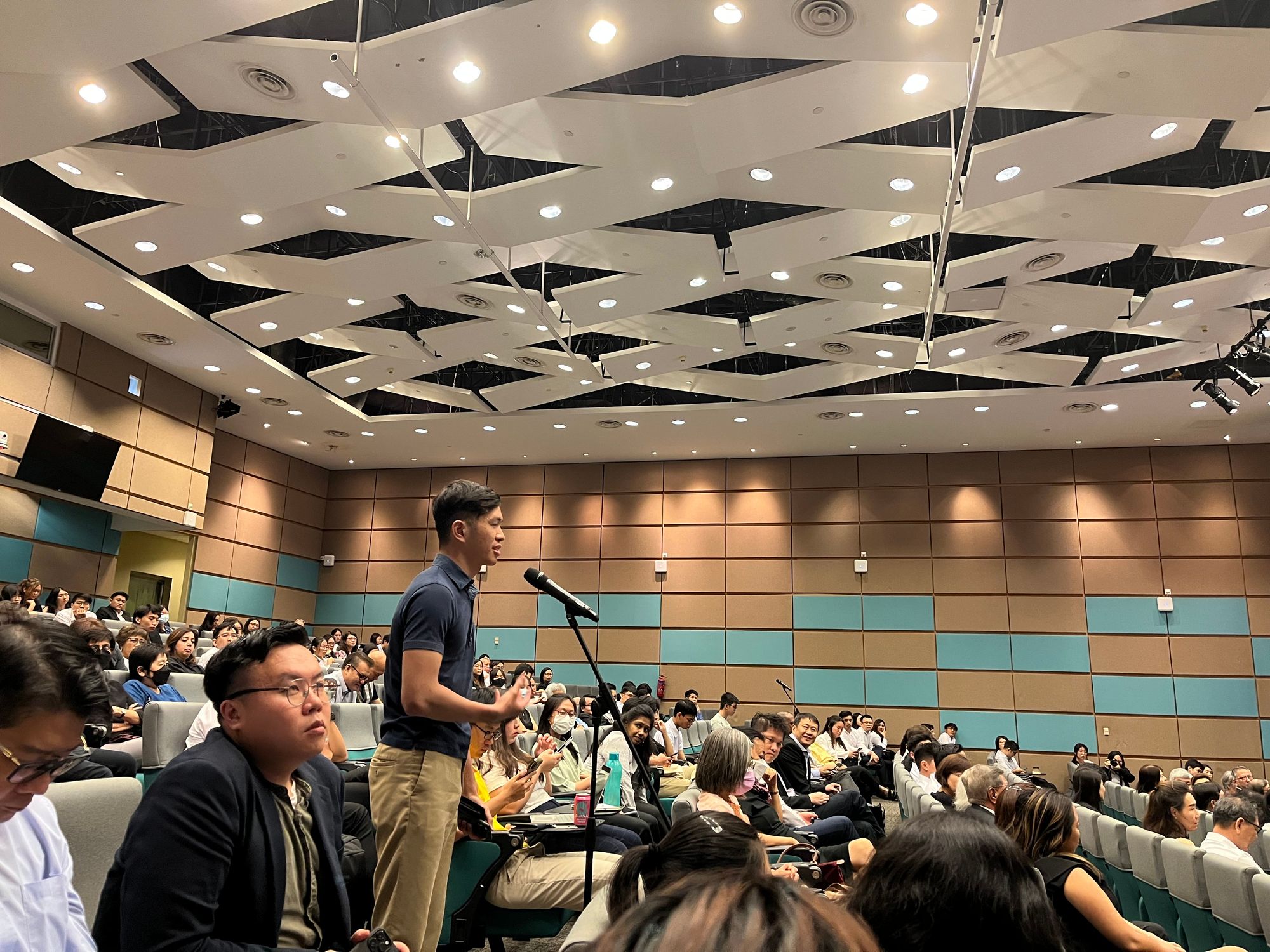
Gradually, the questions tapered off and Justice Ong delivered her closing remarks:
“Well, dinner is out there, so…”
This comment was met with rapturous applause from the audience, who quickly streamed out of the auditorium in search of the buffet table (and the classroom where they could sign out to claim their CPD points).
Three surprising attendees of the SLR Annual Lecture were Mandy Lim, Mabel Khor and Naomi Tan from the Dunman High School Law Society. As part of their outreach efforts, the SLR organising committee had contacted some junior college law interest groups through Instagram and invited them to attend the Annual Lecture.

“It was very well organised and I liked the choice of speaker,” said Mandy, who is the President of the Dunman High School Law Society. “Family law is a very unique area of law and one we don’t hear as much about. [Justice Ong] spoke very concisely, about a topic which is very applicable and important in our conflicted world.” Mabel echoed similar sentiments, adding that although the Dunman High School Law Society had previously invited guest speakers to speak to the club, they had never had someone talk to them about family law before.
The organising committee was pleasantly surprised that the 2023 marked the Annual Lecture’s highest number of sign-ups in a few years—despite being in person.
“I was initially quite worried that the sign-ups for the lecture would be quite lacklustre, as it was held on Friday night and attendees had to make the trip down to BTC,” SLR Chief Editor Mr Darrick Poh shared. “But it was quite heartening to know that we received the highest number of sign-ups that we have had in a while for the SLR Lecture despite the physical format. More than 330 sign-ups, and we even had to close sign ups early as we had reached our venue capacity! The eventual turn out rate was also quite positive, and we have received numerous feedback from attendees that Justice Ong’s lecture was very enjoyable and engaging.
“As the SLR hasn’t had the chance to have an in-person lecture for quite a few years, it was really quite a challenge to put it all together – from finding a sponsor to managing registration to coordinating with many different stakeholders. Nonetheless, I’m really grateful for the support from the rest of the SLR Editorial Board, the Faculty and our sponsor, Clifford Chance. They made the whole organisation and execution of the lecture a lot smoother and much more manageable.”
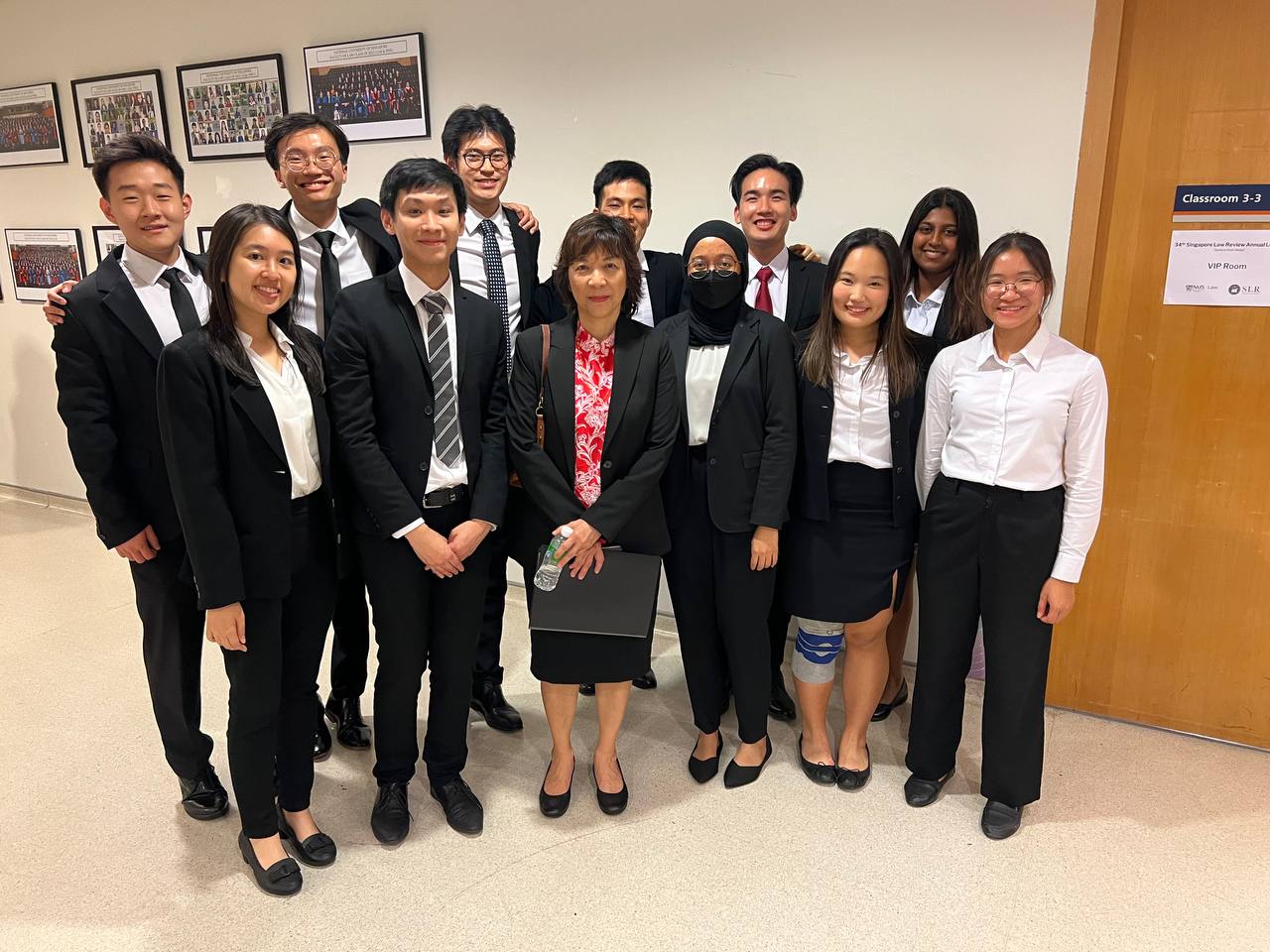
The SLR Annual Lecture Organising Committee:
Darrick Poh, Chief Editor
Chua Kang Le, Deputy Chief Editor (Journal)
Haziratul Zakirah Binte Ghazali, Deputy Chief Editor (Administration)
Daniel Teo, Secretary
Choi Young Jae, Junior Executive Editor
Chloe Kho, Junior Executive Editor
Tan Suan Kai, Junior Executive Editor
Scott Ngai, Junior Executive Editor
Ashley U, Events Director
Lee Jie Yu, Events Director
Karthikeyan Samyukta, Publicity & Communications Director

